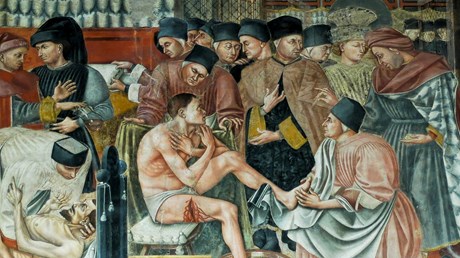This ad will not display on your printed page.
As Christians join the rest of the country in jousting over the proposed changes to our health care system, one significant fact should inform the Christian debate: modern health care is a Christian invention. The reasons Christians developed the world's first health care system—as opposed to simply medical practitioners—are as relevant today as they were 2,000 years ago.
How and why early Christian health care came about is the subject of Gary Ferngren's book Medicine and Health Care in Early Christianity. Ferngren, a professor of history at Oregon State University, argues with his fellow academics who believe that early Christians opposed medicine, thinking that all illness was caused by demons. Instead, Ferngren says, "Christians of the first five centuries held views regarding the use of medicine and the healing of disease that did not differ appreciably from those that were widely taken for granted in the Graeco-Roman world."
Many of Ferngren's colleagues in this field of research must think that early Christians believed demons brought on disease and that exorcism was the only cure. Nothing else could explain the lengths he goes to—two-thirds of the book—debunking the notion.
Medicine, as developed by the Greeks, was a naturalistic field. Doctors studied the body, made observations, and practiced their art without appeal to Greek divinities. So Christians had no reason to oppose its practice. They did, however, advise fellow believers on how to use medicine. For example, some preachers taught that the truly spiritual would forgo medical care, relying on prayer alone, but all taught that God heals through the work of the physician. In addition, medical literature—a piece of classical education—provided a wealth of metaphors and illustrations that educated Christian preachers wove into their sermons.
Imago Dei and ancient health care
When an epidemic struck in the ancient world, pagan city officials offered gifts ...


